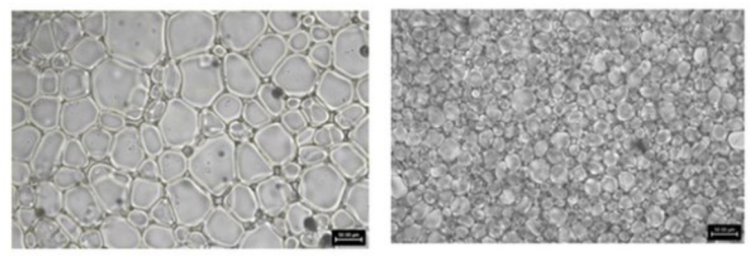Soy-Based Alternative for Preventing Freezer Burn
The Problem
Consumers often purchase frozen foods at lower cost than fresh food with the intent of preventing food waste, so it can be frustrating when frozen food is affected by freezer burn, or ice recrystallization. This causes reduced shelf life and quality. Ice recrystallization inhibitors (IRIs) can be made from antifreeze proteins (AFPs). While natural AFPs exist, they are limited and not economically efficient to extract or purify. Animal-based AFPs, such as gelatin, can be used as IRIs but are not suitable for vegan or vegetarian applications.
The Solution
Researchers at the University of Tennessee have developed an IRI using a soy protein-phospholipid (PL) complex. The complex is a combination of hydrolyzed soybean proteins and soy lecithin, and when the two compounds are combined in various ratios, the soy peptide-PL complex formed demonstrates a high ice recrystallization inhibition activity. The complex inhibits ice recrystallization by preventing water from adsorbing to existing layers of ice and creating more ice crystals. At a concentration of 2% PL w/w, the complex showed similar reductive qualities as higher concentrations. This technology can help reduce freezer burn waste and promote plant-based product lines.

Benefits
| Benefit |
|---|
| Cost-effective and environmentally friendly alternative to animal-based options |
| Reduce waste of almost $6 billion of frozen food each year |
| Reduce zoonotic disease transmission, and alleviate other health concerns, such as cancer and heart disease |
| Serve vegan and vegetarian markets and reduce animal cruelty |
More Information
- Tyler Newton
- Assistant Technology Manager
- 865-974-1882 | cnewto12@tennessee.edu
- UTRF Reference ID: 24047
- Patent Status:

Innovators
Dr. Toni Wang

Professor, Department of Food Science, College of Arts and Sciences, UT Knoxville
Dr. Wang received her PhD from Iowa State University in Food and Lipid Chemistry. Dr. Wang's research (with a total of ~$13 million funding) is focused on identifying novel and practical solutions for problems and challenges associated with processing, utilization, and functionalities of agricultural products intended for food, feed, biomaterials, and energy uses. She aims to use fundamental chemistry of lipids and proteins in new ways to improve food quality, functionality, safety, and health, and to reduce waste and environmental impact.
Read more about Dr. Toni Wang